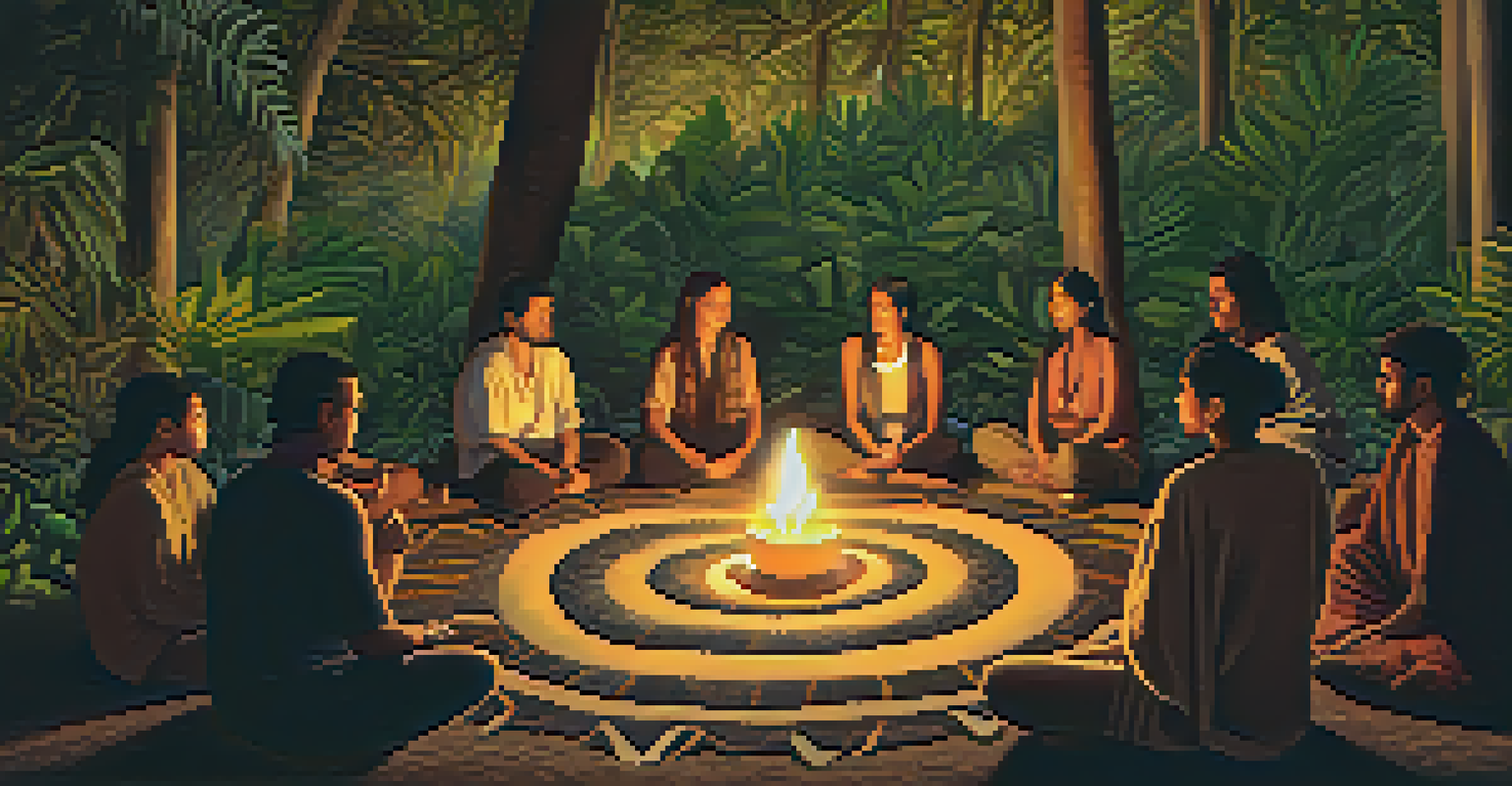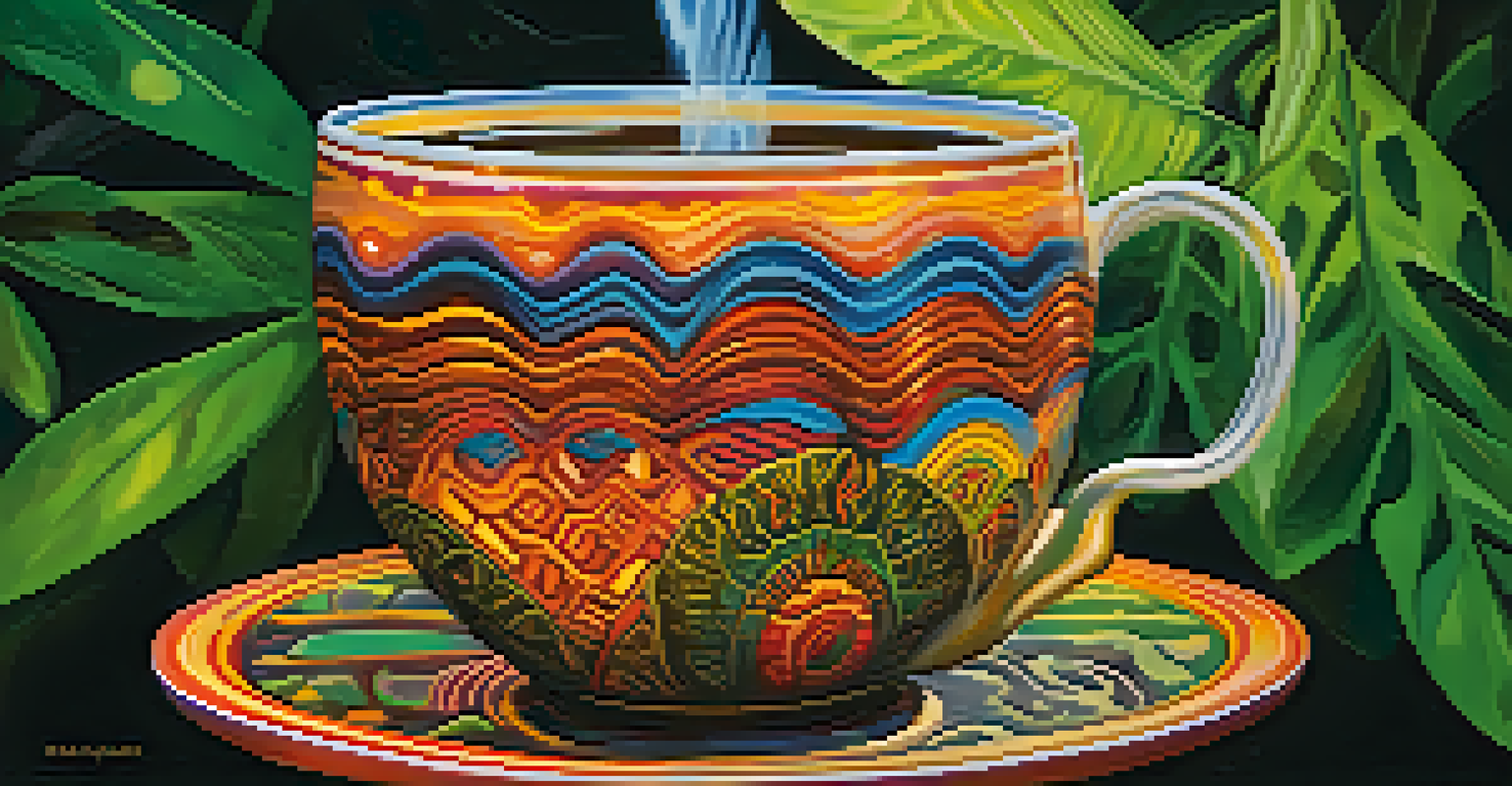Ayahuasca Experiences: Disrupting Norms of Reality

What is Ayahuasca and Its Cultural Roots?
Ayahuasca is a traditional Amazonian brew made from the Banisteriopsis caapi vine and other plants, often used in spiritual ceremonies. Its use dates back centuries among indigenous tribes, who employed it for healing and spiritual insights. This potent mixture contains psychedelics, primarily DMT, which can lead to profound experiences that challenge our understanding of reality.
The experience of Ayahuasca can lead to profound insights into the nature of reality and self, fostering a deeper connection with the universe.
The cultural significance of Ayahuasca is immense; it’s not just a drink but a sacred ritual that connects individuals to their ancestors and the environment. Ceremonies typically involve a shaman who guides participants through their journeys, creating a safe space for exploration. This connection to community and tradition enhances the overall experience, making it a deeply personal yet shared journey.
As more people from outside these cultures seek out Ayahuasca experiences, there’s a growing interest in understanding its origins and implications. Recognizing its cultural roots is essential to appreciating the depth of the experience and respecting the traditions it stems from.
The Psychological Effects of Ayahuasca
Many who participate in Ayahuasca ceremonies report intense psychological effects, often described as a journey into their subconscious. Participants may confront personal traumas, fears, or unresolved emotions, leading to a cathartic release. This process can be both challenging and healing, as individuals often emerge with newfound clarity about their lives.

These experiences are not just about seeing vivid visions or feeling euphoric; they can also involve deep introspection. For instance, someone might relive a past event from a different perspective, gaining insights that were previously obscured. This shift in perception can lead to lasting changes in behavior and mindset, disrupting previously held beliefs about oneself.
Cultural Roots of Ayahuasca
Ayahuasca is a sacred Amazonian brew with deep cultural significance, traditionally used for healing and spiritual insight.
Research is beginning to catch up with anecdotal evidence, showing that Ayahuasca can positively impact mental health. Studies suggest it may help with conditions like depression and PTSD, although more research is needed to fully understand the mechanisms at play. The psychological journey is as complex as it is transformative, opening doors to new ways of understanding oneself.
Physiological Responses: What Happens During a Trip?
When consuming Ayahuasca, the body undergoes various physiological changes, including increased heart rate and altered perception of time. Users often describe a visceral connection to their physical bodies, heightened senses, and a deep sense of interconnectedness with nature. This can create a profound experience that feels both exhilarating and overwhelming.
Integration is key; without it, the lessons learned can fade away, leaving participants adrift in their daily lives.
Many participants also experience purging, which is considered a crucial part of the process. This can include vomiting or intense emotional release, often interpreted as detoxifying both the body and mind. While it may sound unpleasant, many view this as a necessary step toward healing and clarity, often leading to a sense of relief afterward.
Understanding these physiological responses can help demystify the experience. While Ayahuasca can be challenging, the body’s reactions often reflect the deep work being done on a psychological level. This interconnectedness between body and mind plays a significant role in the transformative potential of Ayahuasca.
Challenging Perceptions of Reality
Ayahuasca experiences can fundamentally challenge one’s perception of reality, often leading to a sense of unity with the universe. Participants may feel as if they are seeing beyond the veil of everyday life, gaining insights into the nature of existence itself. This can be a disorienting yet enlightening experience, prompting individuals to question their beliefs and understanding of the world.
For many, these journeys lead to a profound reevaluation of life’s priorities and values. It’s not uncommon for someone who once chased material success to return with a renewed focus on relationships and personal growth. This shift can disrupt societal norms and expectations, encouraging a more authentic way of living.
Psychological and Physiological Effects
Participants often experience intense psychological journeys and physiological responses, leading to transformative insights and emotional release.
Through this lens of expanded consciousness, individuals may also develop a greater empathy for others. The realization that we are all connected can foster a sense of responsibility toward the environment and society. This broader perspective is one of the most impactful aspects of Ayahuasca, prompting change not just within the self but also in the wider community.
The Role of Set and Setting in Ayahuasca Journeys
The concepts of 'set' (the mindset of the participant) and 'setting' (the physical and social environment) are crucial in shaping an Ayahuasca experience. A supportive environment, often created by skilled shamans and facilitators, can significantly enhance the journey. Conversely, a negative mindset or an uncomfortable setting can lead to challenging or distressing experiences.
Creating a safe space is essential, as participants often navigate vulnerable emotional terrain. This includes not just physical comfort but also emotional support from guides and fellow participants. The communal aspect of the ceremony can foster a sense of safety, allowing individuals to delve deeper into their experiences.
Moreover, preparing mentally and emotionally before the ceremony can influence one’s experience. Participants are often encouraged to meditate, reflect, or even engage in dietary restrictions leading up to the ceremony. Such preparatory practices can set a positive tone, enhancing the overall journey and its transformative potential.
Integration: Making Sense of the Experience
Integration refers to the process of making sense of and incorporating the insights gained from an Ayahuasca experience into everyday life. After the intense journey, many find it crucial to reflect on their experiences and discuss them with others. This can help in understanding the lessons learned and how to apply them moving forward.
Support groups, therapy, or follow-up ceremonies can provide additional avenues for integration. Sharing experiences with others who have undergone similar journeys can foster a sense of community and understanding. This shared experience often helps individuals process what they’ve encountered, making the transition back to daily life smoother.
Ethical Use and Community Respect
Engaging with Ayahuasca requires a respectful understanding of its cultural roots and ethical considerations to honor indigenous practices.
Without proper integration, the profound insights gained from Ayahuasca might fade or feel disconnected from reality. By actively engaging in this process, individuals can ensure that their journeys yield lasting change and deeper self-awareness. Integration becomes a bridge from the mystical experience back to the mundane, enriching both.
Ayahuasca and Ethical Considerations
As the popularity of Ayahuasca grows, so do the ethical considerations surrounding its use, especially among non-indigenous participants. There’s a fine line between respectful engagement and cultural appropriation, and it’s essential to approach Ayahuasca with humility and awareness. Understanding its cultural significance can guide respectful practices and promote genuine connection.
Many indigenous communities emphasize the importance of reciprocity and gratitude when engaging with Ayahuasca. This includes acknowledging the sources of the medicine and contributing to the communities from which it comes. Ethical participation can enhance the experience, ensuring that it honors the traditions and beliefs of the cultures that have safeguarded this knowledge for generations.

Furthermore, it's vital to seek out reputable and ethical facilitators who prioritize safety and respect for traditional practices. This not only enhances the individual’s experience but also supports the sustainability of Ayahuasca practices within indigenous communities. Being mindful of these ethical considerations can lead to a more meaningful and respectful interaction with this powerful substance.